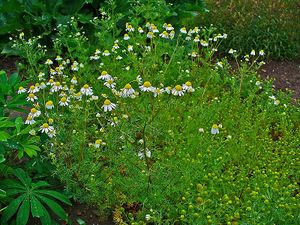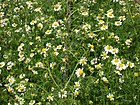Note: This is a project under development. The articles on this wiki are just being initiated and broadly incomplete. You can Help creating new pages.
Difference between revisions of "Matricaria recutita - Matricaria chamomilla"
(→Identification) |
|||
| (8 intermediate revisions by 2 users not shown) | |||
| Line 3: | Line 3: | ||
==Uses== | ==Uses== | ||
| − | {{Uses|Emotional healing}}, {{Uses| | + | {{Uses|Emotional healing}}, {{Uses|Indigestion}}, {{Uses|Hairfall}}, {{Uses|Minor burns}}, {{Uses|Eczema}}, {{Uses|Blotches}}, {{Uses|Anxiety}}, {{Uses|Hair rinse}}, {{Uses|Earache}}. |
==Parts Used== | ==Parts Used== | ||
| Line 35: | Line 35: | ||
==Identification== | ==Identification== | ||
===Leaf=== | ===Leaf=== | ||
| − | {{Leaf|Simple| | + | {{Leaf|Simple|Alternate|The leaves are light green and feathery with a bipinnate pattern}}<ref name="Leaf"/> |
===Flower=== | ===Flower=== | ||
| Line 41: | Line 41: | ||
===Fruit=== | ===Fruit=== | ||
| − | {{Fruit| | + | {{Fruit|Simple|7–10 mm|Clearly grooved lengthwise, Lowest hooked hairs aligned towards crown||Many}} |
===Other features=== | ===Other features=== | ||
| Line 53: | Line 53: | ||
==How to plant/cultivate== | ==How to plant/cultivate== | ||
| − | + | Matricaria chamomilla is grown in all types of soils and climatic conditions but prefers cool condition.<ref name="How to plant/cultivate"/> | |
==Commonly seen growing in areas== | ==Commonly seen growing in areas== | ||
| Line 70: | Line 70: | ||
<references> | <references> | ||
| − | <ref name="chemical composition">[https://www.ncbi.nlm.nih.gov/pmc/articles/PMC3210003/ | + | <ref name="chemical composition">[https://www.ncbi.nlm.nih.gov/pmc/articles/PMC3210003/ Chemical constituents]</ref> |
| − | <ref name="Leaf">[https://www.herbal-supplement-resource.com/german-chamomile.html | + | <ref name="Leaf">[https://www.herbal-supplement-resource.com/german-chamomile.html Plant description]</ref> |
| − | <ref name="How to plant/cultivate">[https://pdfs.semanticscholar.org/4390/bf2bc457a9a5a616a1c81e0c5e6bbb05c8a8.pdf | + | <ref name="How to plant/cultivate">[https://pdfs.semanticscholar.org/4390/bf2bc457a9a5a616a1c81e0c5e6bbb05c8a8.pdf Cultivation"]</ref> |
</references> | </references> | ||
| + | [[Category:Pages without herbs images]] | ||
==External Links== | ==External Links== | ||
| Line 83: | Line 84: | ||
[[Category:Herbs]] | [[Category:Herbs]] | ||
| + | [[Category:Asteraceae]] | ||
Latest revision as of 11:21, 30 May 2020
Chamomile is the common name for several daisy-like plants of the family Asteraceae that are commonly used to make herb infusions to serve various medicinal purposes.
Contents
- 1 Uses
- 2 Parts Used
- 3 Chemical Composition
- 4 Common names
- 5 Properties
- 6 Habit
- 7 Identification
- 8 List of Ayurvedic medicine in which the herb is used
- 9 Where to get the saplings
- 10 Mode of Propagation
- 11 How to plant/cultivate
- 12 Commonly seen growing in areas
- 13 Photo Gallery
- 14 References
- 15 External Links
Uses
Emotional healing, Indigestion, Hairfall, Minor burns, Eczema, Blotches, Anxiety, Hair rinse, Earache.
Parts Used
Chemical Composition
Amino acid, cadmium, co-cultivation, copper, cultivation, medicinal plant, salicylic acid, secondary metabolites, tissue culture[1]
Common names
| Language | Common name |
|---|---|
| Kannada | |
| Hindi | |
| Malayalam | |
| Tamil | |
| Telugu | |
| Marathi | NA |
| Gujarathi | NA |
| Punjabi | NA |
| Kashmiri | NA |
| Sanskrit | |
| English | Chamomile |
Properties
Reference: Dravya - Substance, Rasa - Taste, Guna - Qualities, Veerya - Potency, Vipaka - Post-digesion effect, Karma - Pharmacological activity, Prabhava - Therepeutics.
Dravya
Rasa
Guna
Veerya
Vipaka
Karma
Prabhava
Habit
Identification
Leaf
| Kind | Shape | Feature |
|---|---|---|
| Simple | Alternate | The leaves are light green and feathery with a bipinnate pattern |
Flower
| Type | Size | Color and composition | Stamen | More information |
|---|---|---|---|---|
| Unisexual | 1 inch | Yellow | 5 | Flowers Season is June - August |
Fruit
| Type | Size | Mass | Appearance | Seeds | More information |
|---|---|---|---|---|---|
| Simple | 7–10 mm | Clearly grooved lengthwise, Lowest hooked hairs aligned towards crown | Many | {{{6}}} |
Other features
List of Ayurvedic medicine in which the herb is used
- Vishatinduka Taila as root juice extract
Where to get the saplings
Mode of Propagation
How to plant/cultivate
Matricaria chamomilla is grown in all types of soils and climatic conditions but prefers cool condition.[3]
Commonly seen growing in areas
Tall grasslands, Meadows, Borders of forests and fields.
Photo Gallery
References
External Links
- Ayurvedic Herbs known to be helpful to treat Emotional healing
- Ayurvedic Herbs known to be helpful to treat Indigestion
- Ayurvedic Herbs known to be helpful to treat Hairfall
- Ayurvedic Herbs known to be helpful to treat Minor burns
- Ayurvedic Herbs known to be helpful to treat Eczema
- Ayurvedic Herbs known to be helpful to treat Blotches
- Ayurvedic Herbs known to be helpful to treat Anxiety
- Ayurvedic Herbs known to be helpful to treat Hair rinse
- Ayurvedic Herbs known to be helpful to treat Earache
- Herbs with Flowers used in medicine
- Herbs with common name in English
- Habit - Herb
- Index of Plants which can be propagated by Seeds
- Index of Plants which can be propagated by Cuttings
- Herbs that are commonly seen in the region of Tall grasslands
- Herbs that are commonly seen in the region of Meadows
- Herbs that are commonly seen in the region of Borders of forests and fields
- Pages without herbs images
- Herbs
- Asteraceae





